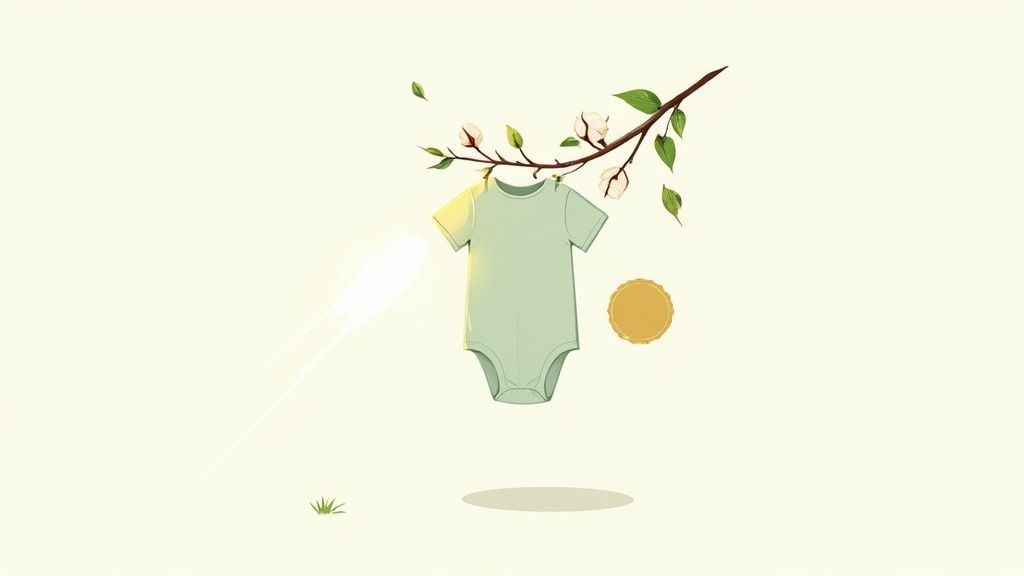
The Best Organic Baby Clothes Brands for Your Little One
Share
When you start looking into the best organic baby clothes brands, you’ll quickly notice a few names pop up again and again. Brands like Hanna Andersson, Burt's Bees Baby, and Kate Quinn Organics have built a reputation for a reason—they’re committed to quality, safety, and doing things the right way. They all lean heavily on GOTS-certified materials, ethical production, and fabrics that are just incredibly soft on a baby's sensitive skin.
Why Organic Baby Clothes Are More Than a Trend
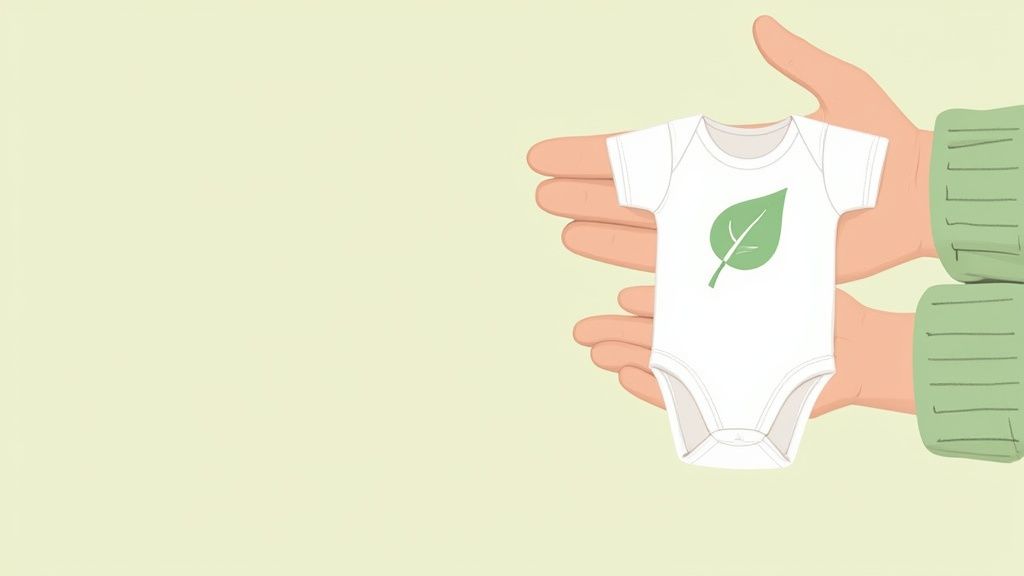
If you've heard more parents talking about organic baby clothes lately, you're not imagining it. This isn't just another passing fad. It’s a conscious choice rooted in a deep desire for health, comfort, and a better future for our kids.
Here’s the thing: a baby’s skin is much thinner and more porous than our own. That makes them incredibly sensitive to anything they come into contact with, especially the chemicals often found in standard clothing.
Take conventional cotton, for instance. It’s one of the most pesticide-heavy crops on the planet. Traces of those chemicals can stick around in the final fabric, which is the last thing you want against your baby’s skin. By choosing organic, parents are simply opting for clothes made from materials grown and processed without all that stuff. You can learn more about this by checking out our guide to chemical-free baby products.
The Real Benefits for Your Baby and the Planet
When you choose organic, you’re making a choice that benefits both your little one and the world they'll inherit. It really boils down to a few core ideas that have a huge impact.
- Gentler on Sensitive Skin: Organic fibers are grown without toxic pesticides and processed without harsh chemical dyes. This simple change dramatically cuts down the risk of skin irritation, rashes, and allergies.
- Superior Comfort and Breathability: Natural, organic fabrics just feel better. They're often softer and more breathable, which helps regulate your baby's temperature and keeps them comfy all day long.
- Eco-Friendly Farming Practices: This is the big-picture win. Organic farming builds healthy soil, conserves water, and keeps chemical runoff out of our rivers and streams. It supports a healthier planet from the ground up.
And it’s clear parents are catching on. The global organic baby clothing market was valued at a whopping USD 2.02 billion in 2024, and it’s only expected to grow from there. That number tells a story—it shows a massive shift toward more thoughtful and responsible shopping.
By choosing organic, you're not just buying a piece of clothing; you're supporting a system that values purity and sustainability from the farm to your baby's closet. It's a small change that contributes to a much bigger positive impact.
How to Read Labels and Understand Certifications
Ever walk down the baby aisle and feel your head spin? You're bombarded with labels shouting "eco-friendly," "natural," and "pure." It’s easy to get lost in all that marketing noise.
But when you're looking for genuinely organic baby clothes, a few key certifications are your best friends. They cut right through the clutter and tell you what’s actually safe and sustainable. Think of them as a gold seal of approval. These aren't just fancy logos; they're a promise that a piece of clothing has met incredibly strict standards, from the cotton field all the way to the finished onesie in your hands.
Learning to spot these certifications is the single best way to shop with confidence.
Decoding the Most Important Labels
The undisputed champion in the textile world is the Global Organic Textile Standard (GOTS). If you see the GOTS seal, you know that at least 95% of the fibers are certified organic. But it doesn't stop there.
GOTS looks at the entire process—the dyes used, how wastewater is treated, and even the social conditions for factory workers. It’s the highest standard you can find, period.
Another fantastic label is the OEKO-TEX® Standard 100. Where GOTS is all about the organic origin and ethical production, OEKO-TEX focuses on the finished product. It certifies that the item is completely free from a long list of harmful chemicals and substances. It's an extra layer of peace of mind.
If you're curious to dig deeper, you can find out more about what the OEKO-TEX Standard 100 certification means and why it’s such a great thing to see on your baby’s clothes.
This simple visual helps put it all into perspective, showing you what really matters on a clothing tag.
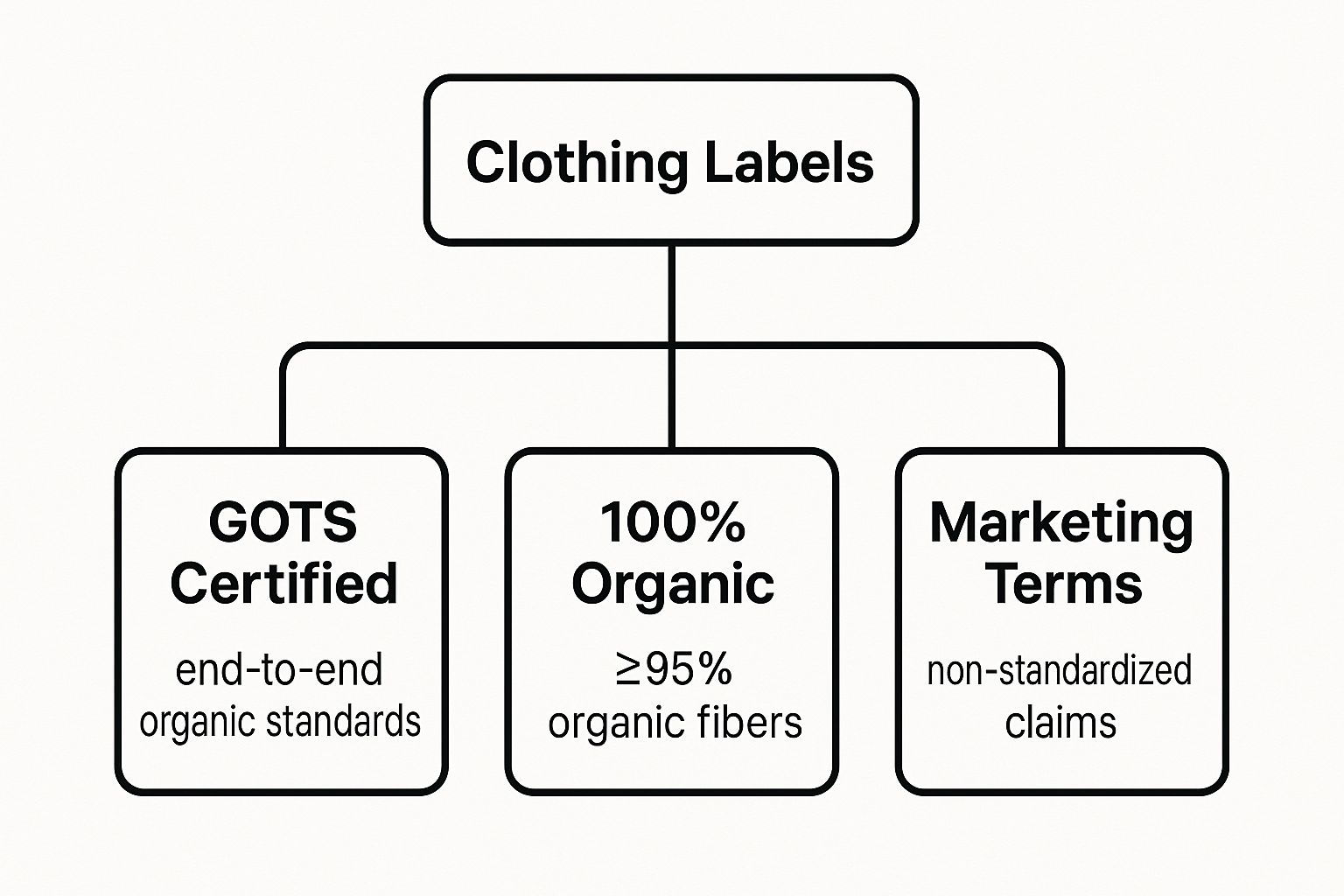
As you can see, a GOTS certification is the most comprehensive guarantee you can get, while those vague marketing terms don't really promise anything at all.
To help you quickly make sense of it all while you're shopping, here’s a simple table breaking down the most common certifications you'll come across.
Common Organic Certifications at a Glance
| Certification | What It Guarantees | Key Focus Area |
|---|---|---|
| GOTS | At least 95% organic fibers, plus strict environmental and social standards from farm to factory. | Entire Supply Chain |
| OEKO-TEX Standard 100 | The final product has been tested and is free from over 100 harmful substances. | Product Safety |
| USDA Organic | Only certifies the raw fiber (e.g., the cotton) as organic. Doesn't cover manufacturing. | Raw Materials |
This little cheat sheet makes it so much easier to know what you're actually buying. Stick to GOTS and OEKO-TEX, and you can't go wrong.
Your Quick Checklist for Reading Tags
When you're out shopping (or scrolling online), just keep these few things in mind. It's a simple way to make sure you're getting the real deal.
- Look for the GOTS Logo: This is your top priority. The official logo should be right there on the tag, not just mentioned in a product description.
- Check the Fiber Content: A label that says "100% Organic Cotton" is a great start, but it's much more powerful when backed by a GOTS certification.
- Be Wary of Vague Terms: Phrases like "eco-friendly" or "all-natural" sound lovely, but they are completely unregulated. Without a real certification, they often don’t mean a thing.
By focusing on trusted certifications like GOTS and OEKO-TEX, you can easily tell which products are genuinely organic and which ones are just using clever marketing. It’s the simplest way to ensure every piece you buy is as safe and gentle as you expect.
The Best Organic Fabrics for a Baby's Sensitive Skin
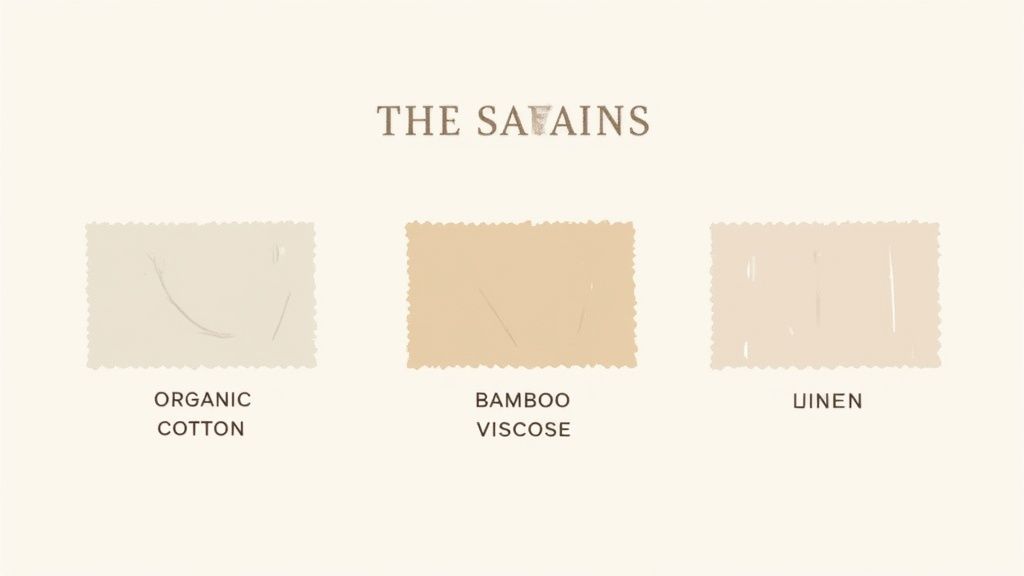
When you're shopping for your little one, picking the right fabric is a huge deal. A baby's skin is incredibly delicate—it can be up to five times thinner than an adult's. That thinness means it's also super porous, absorbing whatever it comes into contact with. This is why a gentle, non-irritating material isn't just a nice-to-have; it's essential.
Think of that onesie or sleeper as your baby’s first layer of protection against the world. While lots of fabrics might feel soft to the touch, how they're grown and processed makes all the difference for sensitive skin. The best brands out there get this, choosing fabrics that are pure, breathable, and free from any harsh chemical residues.
It’s no surprise that parents are catching on. This shift in awareness is a big reason why the global baby apparel market is expected to hit a staggering USD 350.30 billion by 2033. We’re all looking for safer alternatives to conventional clothing, which can often be treated with irritating dyes and finishing chemicals.
GOTS-Certified Organic Cotton: The Undisputed Champ
If there's one fabric that reigns supreme in the baby world, it's GOTS-certified organic cotton. It really is the gold standard, offering an unbeatable mix of softness, breathability, and purity. It's perfect for everything from their very first onesie to those cozy little sleep sacks.
Because it's grown without pesticides and processed without nasty chemicals, it's naturally hypoallergenic. This drastically cuts down the risk of skin irritation or rashes, creating a safe little haven for your baby. On top of that, it's breathable, which helps regulate their body temperature—keeping them cool when it's warm and snug when it's chilly.
The magic of organic cotton lies in its long, soft fibers. They create a fabric that somehow gets even softer with every single wash, all while being durable enough to handle the endless cycle of the washing machine.
Other Amazing Organic Fabrics to Consider
While organic cotton is a fantastic go-to, it’s not the only great option out there. A few other materials bring their own unique benefits to the table, and they're perfect for rounding out your baby's wardrobe. If you want to dive deeper, you can check out our guide on the best fabrics for sensitive skin.
Here are a few other wonderful choices:
- Bamboo Viscose: Famous for its buttery-soft, almost silky feel. Bamboo is also thermoregulating, which is a fancy way of saying it helps keep your baby comfortable no matter the temperature. It’s a pro at wicking moisture away from the skin, too.
- Linen: This timeless fabric is an absolute hero in warm weather. Linen is incredibly breathable and just keeps getting softer and softer with every wash. It’s also one of the strongest natural fibers, so those little linen rompers are built to last.
- Hemp: A lot like linen, hemp is strong, breathable, and naturally resists mold and mildew. It's a true eco-warrior, requiring very little water and no pesticides to grow, making it both a sustainable and skin-friendly choice.
Our Picks for the Best Organic Baby Clothes Brands
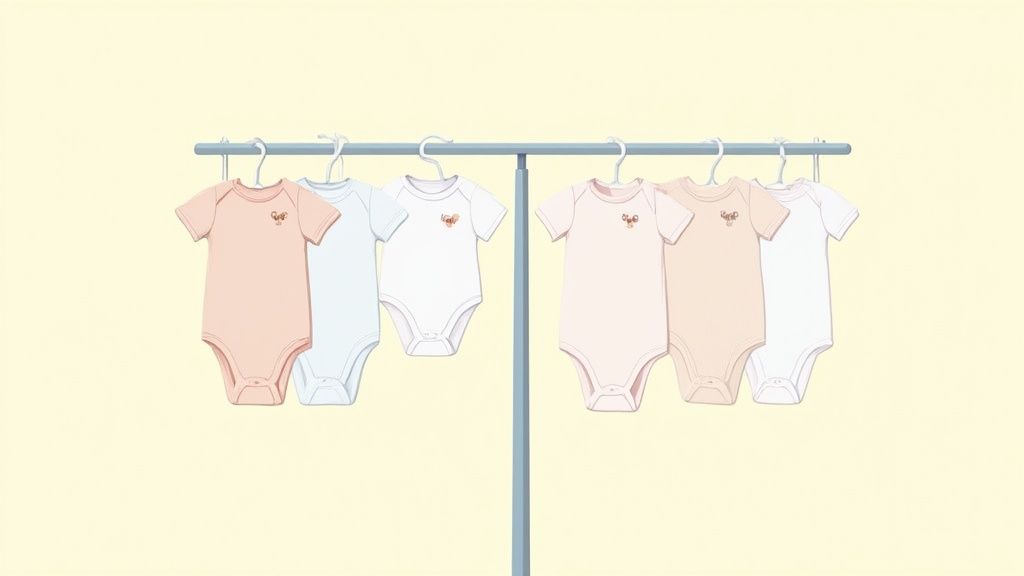
Alright, you’ve got the lowdown on what all those labels mean. Now for the really fun part—shopping! Jumping into the world of organic baby clothes can feel a bit overwhelming at first, but don't worry. We've done the legwork and narrowed it down to a few standout brands that parents (including us!) absolutely love.
These aren't just brands that slap an "organic" label on their stuff. They're the real deal, consistently delivering on quality, ethics, and of course, super cute styles. They’re committed to things like GOTS-certified materials and transparent production, creating clothes that actually hold up, wash after wash.
For Buttery-Soft Basics and Sleepwear
When you’re talking about everyday essentials like bodysuits and PJs, comfort is everything. A few brands have totally nailed the art of creating the softest, snuggliest pieces you can find.
MORI is practically legendary for its signature fabric. It’s a special blend that feels incredibly soft against a baby’s delicate skin. They are the go-to for sleepwear, from cozy sleep sacks to pajama sets that parents just rave about.
Boody offers a fantastic alternative with its eco-friendly bamboo viscose. The result is clothing that’s exceptionally gentle, breathable, and silky smooth. If you’re curious about the thermoregulating magic of bamboo, you can dive deeper into the benefits of bamboo baby pajamas in our detailed guide. Boody’s simple, timeless designs make them perfect for building a solid wardrobe foundation.
The real test of a great basic? It has to survive daily life. These brands make clothes that not only feel amazing on day one but stay soft and keep their shape through endless spit-up, spills, and spin cycles.
For Vibrant Prints and Playful Styles
Think organic clothing is all beige and boring? Think again! If you love dressing your little one in cheerful patterns and unique designs, you’re going to adore these brands.
- Aster & Oak: This Australian brand is a favorite for its stunning, nature-inspired prints. Every design is hand-illustrated, which gives their rompers and dresses a beautiful, artistic touch.
- Mightly: Built for play, Mightly makes durable, fair-trade certified clothes in fun, gender-neutral styles. Their leggings and pajamas feature bold prints that kids go wild for, and parents appreciate that they’re tough enough to become hand-me-downs.
These brands make it so easy to find outfits that show off your baby's budding personality without compromising on safe, sustainable materials.
For The Purest Possible Materials
For parents looking for the most natural, unprocessed options—especially for newborns or babies with sensitive skin—some brands go the extra mile.
Bébénca Organics is a fantastic example. Their signature collection is made from unbleached and undyed GOTS-certified organic cotton. It’s completely free from chemical processing, leaving a pure, off-white fabric that’s as gentle as it gets. This total focus on purity means you don't have to worry about a single potential irritant. It’s the ultimate peace of mind.
To help you get a quick overview, we've put together a little cheat sheet of our favorite brands.
Top Organic Baby Brand Highlights
This table offers a comparative look at our favorite organic baby clothes brands, focusing on key features to help you choose the best fit for your needs.
| Brand Name | Best For | Price Range | Key Feature |
|---|---|---|---|
| MORI | Buttery-soft sleepwear | $$ - $$$ | Signature organic cotton & bamboo fabric blend |
| Boody | Silky bamboo basics | $$ | Breathable & thermoregulating bamboo viscose |
| Aster & Oak | Artistic, nature-inspired prints | $$ - $$$ | Hand-illustrated designs on organic cotton |
| Mightly | Durable, fair-trade play clothes | $ - $$ | Built to last with vibrant, kid-friendly prints |
| Bébénca Organics | The purest, undyed fabrics | $$ | Undyed & unbleached GOTS-certified cotton |
Choosing any of these brands is a great step, but the best one for you really comes down to your family's specific needs, style, and budget. Happy shopping
How to Care for and Get the Most from Organic Clothes
You’ve invested in some beautiful, high-quality organic pieces for your baby. That’s a huge win for their comfort and health! Now, how do you make sure those super-soft garments last?
The great news is that with a little TLC, these clothes can easily handle the realities of baby life—spit-up, spills, and all—and still look good enough to be passed down.
https://www.youtube.com/embed/6Gt4htyrqr8
Caring for organic fabrics isn't complicated at all. In fact, it’s usually simpler and greener than your typical laundry day. Since these materials are made without harsh chemical treatments, a gentler approach is all you need to protect their natural softness and keep the colors from fading.
Eco-Friendly Laundry Tips
Think of your laundry routine as part of the same commitment you made when you chose organic in the first place. A few small changes can make a massive difference in how long the clothes last, and they’re much kinder to the planet, too.
Here are a few easy habits to get into:
- Wash in Cold Water: Always go for a cold, gentle cycle. Hot water is the enemy of natural fibers like organic cotton—it can cause them to shrink and is tough on plant-based dyes. Bonus: washing cold saves a ton of energy.
- Use a Gentle Detergent: Pick a mild, pH-neutral detergent without any fragrances, dyes, or phosphates. Strong chemical detergents can strip the softness right out of the fabric and might irritate your baby’s delicate skin.
- Air Dry Whenever You Can: A tumble dryer on low heat is fine in a pinch, but line drying is the absolute best choice. It’s the gentlest way to dry clothes, prevents shrinking, and saves a surprising amount of electricity. Plus, a little sunshine is a natural disinfectant and brightener!
Following these simple steps isn't just about cleaning clothes; it's about preserving the pure, soft quality you chose for your baby.
The goal is to treat organic fabrics with the same gentle care that went into making them. A simple, low-impact laundry routine is the secret to keeping them soft, safe, and beautiful for years to come.
Smart Shopping Strategies
Getting the most bang for your buck also comes down to how you shop. It’s never been easier to find the best organic baby clothes brands, thanks to so many of them selling directly to parents online.
This direct-to-consumer model means you get a much better selection than you’d ever find in a brick-and-mortar store. It’s a huge reason why the organic baby clothing market is projected to grow at a rate of 5.3% each year between 2025 and 2032. If you're curious about what's driving this trend, you can dig into the numbers and digital strategies in the latest organic baby clothing market report.
A Few Common Questions You Might Have
Even when you know all the benefits, dipping your toes into the world of organic baby clothes can bring up a few questions. That's totally normal! We've gathered some of the most common things parents ask and laid out the answers, plain and simple.
Think of this as the last little bit of info you need to feel completely confident about dressing your little one in the best, most natural fabrics.
Is Organic Baby Clothing Really Worth the Higher Price Tag?
It’s true, you’ll often notice that the best organic baby clothes brands have a slightly higher price. But most parents who make the switch find it's an investment that pays for itself. The quality is just on another level—the fabrics are softer, more durable, and can handle wash after wash without falling apart. These are the pieces you can actually pass down to the next baby.
Beyond durability, you're paying for peace of mind. Knowing there are no harsh chemical residues or irritating dyes touching your baby's brand-new skin is a feeling you can't put a price on. Plus, you’re supporting a much kinder way of doing things, from the farm to the factory. It’s a purchase that feels good for your family and the planet.
How Do I Know if a Brand is Genuinely Organic?
This is a great question, especially with so much "greenwashing" out there trying to trick you. The single best way to know for sure is to look for a trusted third-party certification right on the tag or in the online product description.
- The Gold Standard: The Global Organic Textile Standard (GOTS) is the one you really want to see. It’s the top dog in the organic textile world and guarantees the entire process—from a pesticide-free cotton field to the final stitch—is clean and ethical.
- What to Look For: Don't fall for vague words like "eco-friendly" or "natural." Those terms mean nothing without a real certification to back them up. Look for the official GOTS logo.
A truly organic brand will be proud of their certifications and happy to talk about them. If they've done the hard work to earn that little logo, they'll want you to see it!
Do Organic Clothes Shrink More Than Conventional Ones?
Because organic cotton isn't treated with harsh anti-shrinking chemicals like formaldehyde (yikes!), it can be a little more susceptible to shrinking. But don't worry—most reputable brands know this and cleverly account for it in their sizing. They cut their patterns just a little bigger to allow for that initial shrinkage.
Your best bet for keeping clothes fitting perfectly is to follow the care label. A simple routine of washing in cold water on a gentle cycle and tumbling dry on low (or even better, air-drying) will keep everything looking and feeling great.
How Can I Build an Organic Wardrobe Without Breaking the Bank?
Creating a beautiful organic collection for your baby doesn't have to be an all-or-nothing splurge. It’s all about being strategic.
Start with the basics that spend the most time against your baby's skin—think bodysuits, sleepers, and maybe a swaddle or two. You can slowly add other items as you go. Keep an eye out for brands that offer multipacks, shop the big seasonal sales, and always sign up for email lists to get those juicy discount codes. Another pro tip? Build a small "capsule wardrobe" where everything mixes and matches. You'll be amazed at how many outfits you can create with fewer, better pieces.
At Little Venture Co., we believe in creating beautiful, faith-inspired clothing that is as gentle on your baby as it is on the planet. Explore our collection of ultra-soft bamboo daywear and sleepwear, all Oeko-Tex® certified for safety and peace of mind. Shop our collection today
